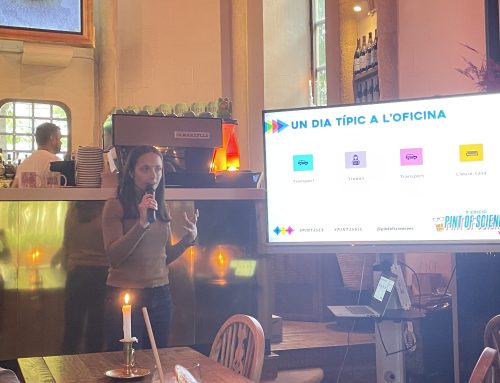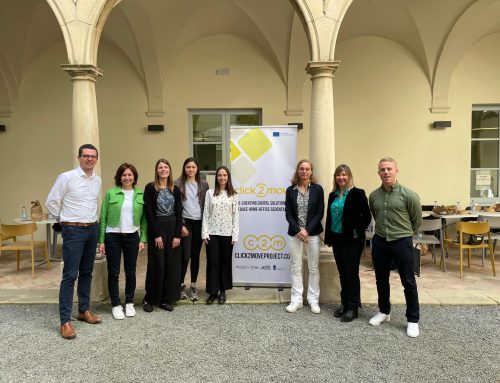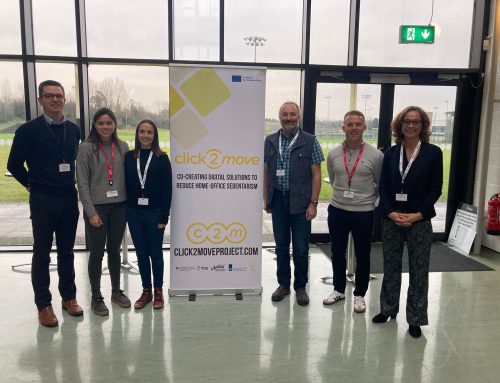Press notice
Vic, 7 June 2022

- The European Click2Move project will analyse the needs of working people and develop a programme based on mobile technology to reduce sedentary behaviour in remote working
- Researchers from the GREAF and M3O research groups at the University of Vic-Central University of Catalonia will take part in this three-year project
- The study will be carried out with institutions in Ireland, Slovenia, the Netherlands and Italy
Physical inactivity, one of the major causes of death worldwide, is very high among office workers, who are estimated to spend two-thirds of their day sitting down. The COVID-19 pandemic has increased the automation and digitization of work, and has exponentially increased remote working – a system that is likely to remain established in society, and which leads to an increase in sedentary behaviour. Several studies are starting to highlight the negative effects of remote working on physical activity, and are offering strategies to combat it. One of these projects is Click2Move, a European initiative led by the University of Vic – Central University of Catalonia (UVic-UCC), which aims to promote jobs offering active and healthy remote working by creating digital solutions and training human resources managers, occupational health specialists and management staff, among others.
The principal investigator of the Click2Move project is Judit Bort, and others taking part are Anna M. Puig and Anna M. Señé, who are all members of the GREAF (Sport and Physical Activity Research Group) and Cristina Vaqué, a researcher in the Methodology, methods, models and outcomes of Health and social sciences (M₃O) research group at UVic-UCC. Click2Move is part of the Walk at work project, led by Anna M. Puig, which aims to improve physical activity and well-being during office work. As a result of this programme, and in the wake of the changes in the way of working arising from the pandemic, Click2Move has focused on office workers engaged in remote working. “If working in an office makes it easier for people to behave in a sedentary way, this situation is aggravated even further with remote working, as there is no need to walk to work, to walk between different places in the same building, or to go out and have a coffee,” explains Judit Bort. With remote working, not needing to leave the home means “we spend more hours in front of the computer, and the home environment often fails to enhance emotional and social well-being, as there is an increased lack of communication and a change of habits,” adds the researcher.
The Click2Move research project is funded by the Erasmus programme, and has a total budget of 400,000 Euros. Several European partners are involved: Technological University of Shannon (Ireland), Zavod Apga (Slovenia), Rijksinstituut voor Volksgezondheid en Milieu (the Netherlands) and the Rete europea per la prevenzione della salute nei luoghi di lavoro (ENWHP) (Italy).
A three-year project
The first working meeting between the partners involved in the Click2Move project will take place online on Friday 3 June. This research will last three years, and will end in 2025. In the first year of the project, the partners will develop a programme that will be implemented based on interviews and discussion groups with workers, managers of companies and other parties involved or those who may influence employees’ behaviour. These interviews will “identify the workers’ needs, and after they have been identified, a panel of experts will be created to raise awareness of occupational health among the workers and all the managers of the companies involved,” says Bort. This programme, based on a mobile app, will enable workers to measure their sedentary behaviour and activity during working hours, and they will receive suggestions and advice for reducing sedentary behaviour. Another task that will be undertaken during the first phase of the project will be a bibliographic search on health among office workers, to determine what has been published to date, and to be able to adapt it to the field of remote working.
In the second year of the Click2Move project, which will have a quantitative and a qualitative dimension, the European Network For Workplace Health Promotion (ENWHP) is scheduled to create online outreach and training programmes to raise awareness of the importance of a more active working life.
Finally, the last year will be given over to implementing the programme worked on during the first year in several companies in the four countries participating in the project: Spain, Ireland, Slovenia and the Netherlands. An assessment will be made at this point to show the effect of physical activity and sedentary behaviours among people doing remote working. One of the aspects that will be studied will be presenteeism, i.e. being at work but with limit levels of productivity. Starting with the assumption that presenteeism levels are higher when working conditions are poor, it will examine whether a change of habits achieves greater well-being at work, and lower levels of presenteeism and higher productivity as a consequence.
This programme will produce guides including various strategies and good practices aimed at workers, occupational hazards and prevention managers, management, public organisations, public health agencies, education and business organisations.









